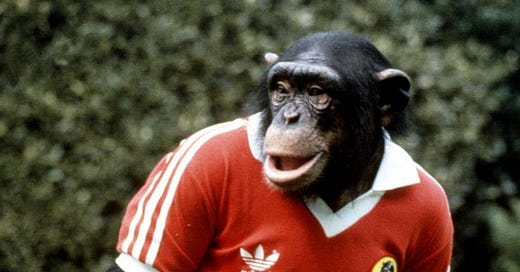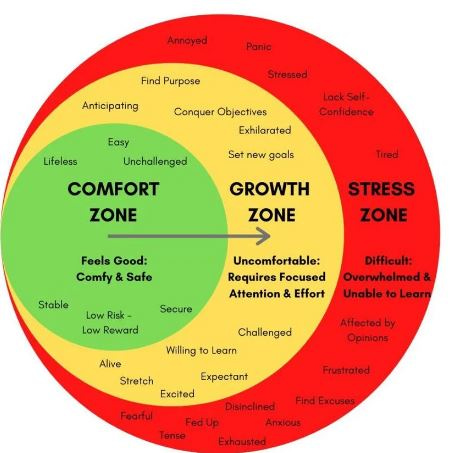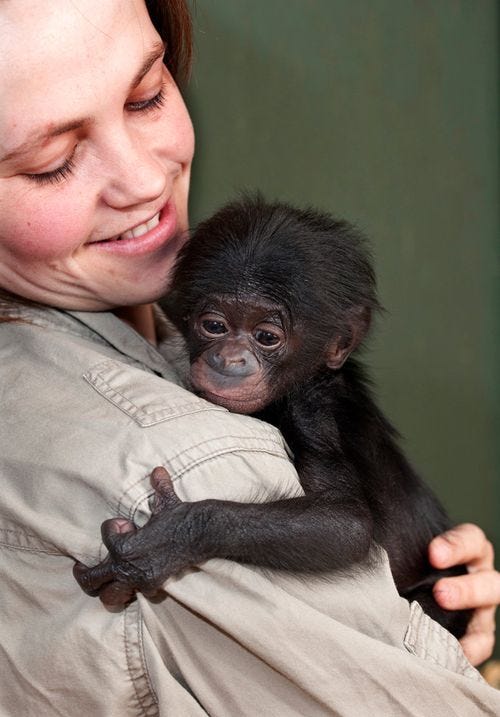My reply to Dr.Bob
This is VERY good. It supports my thesis -- and my argument with people like Caitlin who think that most people are just puppets, controlled from above-- which I think of as an...um..."elevated" conspiracy theory.
The “system” is a "collectivity" -- both bottom up and top-down.
And the "Few" are pimples on the hormonal flesh of the "Many.
Maybe cancers is a better metaphor since they are like normal cells without apoptosis . You point to "comfort'. Ultimately, we do not want to budge from our narrow comfort zone.
The "conspiracy" ? Not Jews or the Illuminati or the Masons. But "us".
To an extent that is human nature. We evolved as rather simple animals. Juvenescent. Living off the abundance of nature. As Marshall Sahlins writes, we spent most our time, eating ,sleeping, playing and having sex. We expended as little effort as possible. We were LAZY and kept things simple. We are still lazy.
We still keep things simple. We still play.
Clarification
That was my reply, which I should clarify since it glosses over a lot of things that I and Dr Bob talk about.
As you may know, I see human beings zoologically – as animals – with biology determining our nature.
Both the philosopher John Gray and the pseudo "evolutionary psychologist" Stephen Pinker do too — but both have a Hobbesian view of human nature.
Gray says "Homo sapiens"is a misnomer it really should be "Homo rapiens"! He says, we are rapacious and violent – like chimpanzees are thought to be. (Hint: yes and no),
Pinker likes to quote Thomas Hobbes as he also compares human beings to chimpanzees: “Life is nasty, brutish, and short” . But our animal nature can be mitigated by nurture and social control by enlightened rulers and reason. As a Harvard professor and multimillionaire, I guess Stephen figures he is one of those rulers to be! He is a full professor at Harvard, at the top of the pyramid of academic power.
Bonobos: make love not war
However, neither Gray nor Pinker pay much attention to our closest relative in the primate world – the Bonobo.
Bonobos are among a select few species that never kill their own kind. They are highly social, matriarchal and the males get to spend all their time playing and having sex.
The “bonobo handshake” is sex, with, well ,anybody. It is fast – about 15 seconds— with females , carried out in the missionary position, unlike doggy-style as is the case with chimpanzees. This appears to be because the female bonobo has a very large clitoris.
Female bonobos ovulate for 15 to 20 days—but are also both hypersexual—and very selective. Reminds me of…no, I better not go there….
Chimps? More of rape culture. Not exactly the primate Nazis some say they are though. In human terms, think of a Football Club in the UK after too much booze.
The bonobo shoulder joint allows greater range of motion than a chimpanzee. The human shoulder allows even more motion, enabling throwing, an important evolutionary advantage.
Why does this matter? This commonality with Bonobos?
It matters because there is little, if any evidence of warfare among hunter gather bands in the Paleo period. Violence, yes, but not warfare. That is partly because these matriarchal bands were small – maybe 30 to 50 people-- and collaborated with other bands to hunt large animals like Mammoths – and also for sex and a larger gene pool. By contrast, Neanderthals were less social and tended to be inbred.
The great anthropologist Marshall Sahlins called Paleo peoples, “the Original Affluent Society”. They had better nutrition than we do today --in Europe and India average heights were around 183 cm (6 ft 0 in) for males and 172 cm (5 ft 8 in) for females. If you survived to age 35, your lifespan would exceed 70 or 80, without the help of doctors.
People worked around 12 to 14 hours a week—and spent the rest of the time playing games, having sex, napping, singing or dancing, or doing creative things, like carving trinkets and art. Yes, most modern art is “Paleo” !.
No one was allowed to dominate anyone else. If they tried, they would be shunned.
Which meant: no fun.
No sex.
We won’t go into the sex thing — you can read Sex at Dawn, which anthropologists hated because they don’t get any. Y’know, it’s “unethical”. Also, the book was written by psychologists — a different tribe, as you know.
If Paleo psycho or socio-paths just tried harder to dominate in their groups, they might be just have been killed.
In other words, no sociopaths or psychopaths in paleo societies — unlike today when we reserve special places for them in the professions, politics, the police and military,/
Paleo life was pretty good but then the climate changed. That seemed better. We no longer had to be constantly on the move.We adapted.
Here’s the deal.
By nature we are lazy.
The creativity that game with “behavioral modernity” 50,000 years ago, allows efficiencies that make things easier.
So instead of hunting animals 10,000 years ago, we bred them.
Instead of foraging, we grew crops.
We opted for sedentary lifestyles in supportive environments like river deltas s, so we didn’t have to walk so much.
But that meant several bands in one place. They had to get along and therefore formed “tribes”—multi-group societies. They needed to allocate space and territory, which demanded a new concept— “property”.
But, by nature, we could only manage empathy and altruism for a maximum of about 30 to 50 individuals – which meant every tribe was composed of discrete groups, looking after their own. . That meant we also had to invent politics, with leaders to organize things so we could get on with doing as little as possible.
Lazy Bubbles
And that’s where we are today.
We have huge societies composed of many groups. We are still lazy. We just want to sing and dance and play and have sex, and we have our toys, We don’t care really about people outside our groups. We live in bubbles of comfort. We have our Bidens and Trumps and their ilk. We don’t care about them. They don’t care about us. They manage the status quo.
But those comfort bubbles are:
a.) artificial
b.) dependent on circumstances
c.) vulnerable to bursting
Nature Doesn’t Care About Deniability
The planet isn’t dying. We’re killing it—and ourselves.
No amount of blame-shifting will stop collapse.
No "leader" will save us because we don’t want to be saved. We want comfortable lies over uncomfortable truths
Dr. Bob is correct.
But I would extend his argument. Our civilizational models are destructive but in the end the planet will likely survive the ongoing catastrophe of civilization. Just, we won’t. We don’t’ want to be saved — and we won’t be.
Bonobos
No, this is not a photo of me as a baby, although there were huge similarities, other than the bonobo being cuter.
Help support my work and Chappy and Ichi was well by buying us coffee!
The url is https://buymeacoffee.com/julicow or just click HERE!










Hi you are a far more interesting thinker than either Grey or Pinker.Pinker is just a shrill for neoliberalism .I think his idea that the world is more peaceful now than at any point in human history is risible.
Fun stuff, no? Locking up the traditional lands for both Homo sapiens and of course brother mammals. Barbed wire, fences, rock walls, viscious dogs, shotguns, and now, Jewish State of Murdering Raping Thieving Starving Pollutiing Poisoning Occupied Palestine.
CCTV up you ass. Now, well FitBit watches for all, and then we have devolved into all these Oppen-Monster-Heimers, too busy in the brains to shut the fuck up and be, and now? Ellison, Zuckerberg, Altman, Karp, Ackman, Adelson, Brin, and shall I name another million Jews and their Jewish Mafia backers?
Ishmael, the gorrilla, from Daniel Quinn's book, Ishmael -- Adventure of Mind and SPirit:
It’s never easy to catch Mother Culture in her lies – even for me, with all my practice. She teaches that the way we live is the only human way to live, and thinking about other ways is an utter waste of time. The characteristic that Mother Culture attaches to the Leaver lifestyle most predominantly is absence. Leavers lack technology (untrue, but no matter), lack history (what they have is merely prehistory), lack the noble institutions of civilization, lack the opportunities for wealth and luxury that we enjoy. The last of these is one of the trickiest of Mother Culture’s deceptions, because at first glance it seems unarguable. Even very modest Taker households boast amenities that would seem miraculous to our ancient ancestors and that would still seem so to Leaver peoples not yet in contact with our culture. In this light, it’s easy to accept the idea that the Taker way is the way of wealth and the Leaver way is the way of poverty.
The answering trick to Mother Culture’s trick is almost always this: When she holds up a picture of Nothing, look for Something. When she holds up a picture of an Absence, look for a Presence.
The Leaver way is not a way of poverty, it’s a way of wealth — but the wealth of the Leaver way isn’t the wealth of products, it’s the wealth of human support. Mother Culture never has names for things she cannot see, and there is no name in English (or any other language I know) for this support. It’s not comraderie or friendship or neighborliness. It’s motivating origins are not to be found in love or charity or kindliness. In Leaver societies, people look after each other for much the same reasons that people in Taker societies take jobs and have careers. In Leaver societies, people look after one another not because they’re saintly but because looking after one another assures that they themselves will be looked after. If they don’t look after one another, then the community disappears — and no one is looked after.
When the members of Family A fall ill, Families B, C, and D share their food with them, because they all know that someday they too could fall ill. When a child is injured, the nearest adult runs to help it, because that adult knows that someday his or her own child may need help. When an aged person becomes sick and helpless, the family of that person isn’t alone with the problem. All share the burden, because all know they will have a similar burden someday and will need others to share it. Those who give support shall receive support.
It’s an economy. An economy based on support instead of products. It works like the diagram to the right…
The Taker economy, by contrast, works like that on the left…
Everyone knows the Taker economy works, but they find it hard to believe that the Leaver economy works too. This is because Taker wealth is so much more visible than Leaver wealth. Products can be photographed, packaged, and put in store windows, but support can’t. There are many other striking differences between these two kinds of wealth.
Taker wealth can be put under lock and key, but Leaver wealth can’t. For this reason, Taker wealth is inherently divisive. Behind the locked doors of my house are my furniture, my appliances, my television sets, my radios, my computers, my clothes, my records, my books. I’ve worked for them, I’ve earned them, and no one else in the world has worked for them or earned them — and this is the dividing line between them and me, between theirs and mine. The law of every Taker nation in the world confirms all this. Leaver wealth, by contrast, is not divisive but inherently unitive.
Taker and Leaver economies are mirror images of each other. Takers are rich in products but poor in human support; Leavers are rich in human support but poor in products. But note this: Takers complain noisily and endlessly over the shortcomings of their economic system, but anthropologists find that Leavers (until their cultures are undermined by Taker contact) seem remarkably content with theirs.
Ever wish you were as secure as a baboon?
The experience of Leavers is one of cradle-to-grave security. This security is not the result of utopian design or nobility of character. It’s the result of eons of evolutionary shaping of their communities. In brief, community structures that did not provide cradle-to-grave security for their members did not survive. The structures we know are the ones that survived. They’re like the species we know: They survived because they worked.
Many readers may wonder if this “cradle-to-grave security” isn’t an exaggeration I indulge in for the sake of making a point. Not so, I assure you. In fact, there’s little reason to be surprised that Leaver peoples should enjoy such security. After all, among our neighbors in the community of life, the very same security is enjoyed in every species whose members form communities. Ducks, sea lions, deer, giraffes, wolves, wasps, monkeys, and gorillas (to name just a few species out of millions) enjoy such security. It has to be assumed that the members of Homo habilis enjoyed such security — or how would they have survived? Is there any reason to doubt that the members of Homo erectus enjoyed such security or that they conferred it upon their descendants, Homo sapiens?
No, as a species, we came into being in communities in which cradle-to-grave security was the rule, and the same rule has been followed throughout the development of Homo sapiens right up to the present moment — in Leaver societies. It’s only in Taker societies that cradle-to-grave security has become a rarity, a special blessing of the privileged few.
In Taker societies, needed support is provided by paid ”professional classes” of support-givers. If your mother becomes ill, for example, your community doesn’t rally round to share the burden of her care. You have to pay people to do that, and the more you spend, the better your mother is cared for and the less heavy your personal burden is. The same is true of any condition that could be alleviated by human support. In Leaver societies, this support is available to everyone in the community, automatically, free of charge. In Taker societies, you pay for it or you don’t get it. And, my oh my, do we ever pay for it!
I haven’t the time or inclination for such research, but it would be fascinating to know how much it costs us to get all the support that is free in Leaver societies. Virtually all services for which we pay taxes are provided for free by members of Leaver societies as an ordinary part of belonging to the community, and they don’t find it especially burdensome to provide them. ”Professional classes” of support-givers are nonexistent or very small; most shamans, for example, do not ”make their living” by healing or by performing religious ceremonies, and most tribal chiefs do not ”make their living” as political leaders.
People sometimes ask if it wouldn’t be possible to achieve the Leaver lifestyle simply by leaping out of the Taker lifestyle into nothing. The answer is no, because the Leaver lifestyle isn’t nothing, it’s an economy — an economy based on a different sort of wealth and on a different sort of economic transaction: not products for products but support for support.
If you’d like to explore the possibility of moving toward a Leaver lifestyle in your community, don’t concentrate on giving up Taker things. To concentrate on giving up Taker things is to concentrate on a negative. The Leaver lifestyle isn’t an absence of Taker things, it’s a presence of something else, and that presence is support.
I’ve conjectured that we can reinvent Leaver-style support systems for ourselves incrementally, bit by bit, by working within our own communities and building on each other’s successes the way inventors of the Industrial Revolution built on each other’s successes. I’ve received a lot of encouragement for this idea, but as yet no one has reported trying it. I suspect the idea of offering any kind of support to anyone makes people very nervous. That’s fine. Don’t start by offering anything. Start by bringing out into the open the fears and reservations you have about the whole idea. That’s progress, because it’s a start.